| Listing 1 - 10 of 25 | << page >> |
Sort by
|
Book
ISBN: 9781785700705 9781785700712 9781785700729 1785700715 1785700723 9781785700736 1785700731 1785700707 1785706675 Year: 2015 Publisher: Oxford Philadelphia
Abstract | Keywords | Export | Availability | Bookmark
 Loading...
Loading...Choose an application
- Reference Manager
- EndNote
- RefWorks (Direct export to RefWorks)
East Asia --- Extrême-Orient --- Asie du Nord-Est --- Civilization. --- Antiquities. --- Civilisation --- Antiquités --- Extrême-Orient --- Antiquités
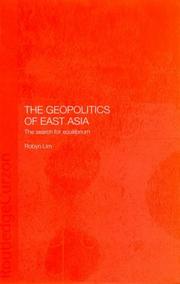
ISBN: 0415297176 0415360307 1134432704 1283712326 0203008405 1134432712 9781134432707 9781134432714 9780203008409 9781134432660 9780415297172 9780415360302 Year: 2005 Publisher: London Routledge
Abstract | Keywords | Export | Availability | Bookmark
 Loading...
Loading...Choose an application
- Reference Manager
- EndNote
- RefWorks (Direct export to RefWorks)
East Asia is a potential area of international conflict, with a number of possible 'flashpoints' and with the absence of strong regional organisations able to deal with conflict resolution. At the same time, global powers frequently get involved in the international politics of the region in order to protect their interests. This book presents a comprehensive overview of the geopolitics of the region. It focuses in particular on the way geographical and historical forces continue to play a key role in shaping international relations here. It considers the role of both regional and internationa
Geopolitics --- Géopolitique --- East Asia --- Extrême-Orient --- Politics and government --- Politique et gouvernement --- International relations. Foreign policy --- anno 1900-1999
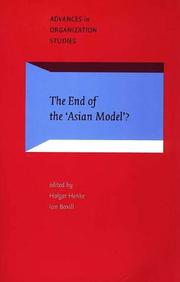
ISBN: 1556197454 9027232997 9786612163913 1282163914 902729982X 9789027299826 9781282163911 6612163917 9781556197451 9789027232991 Year: 2000 Volume: 2 Publisher: Philadelphia J. Benjamins Pub.
Abstract | Keywords | Export | Availability | Bookmark
 Loading...
Loading...Choose an application
- Reference Manager
- EndNote
- RefWorks (Direct export to RefWorks)
With the economic crisis in Asia, which unfolded in recent years, the development 'model' on which the phenomenal earlier success of several countries in the region was built requires increasing scrutiny. This anthology questions the validity of the notion promoted by some observers and international financial organizations that there is a universally applicable model of industrialization common to Asian countries. A number of senior and highly regarded Asia specialists are taking a critical look at the various development experiences of several (and some often neglected) Asian countries and evaluate their experiences in a comparative perspective. Comparing the analyses of countries such as Mongolia, the Pacific Islands, or Sri Lanka with Singapore, South Korea and other countries of the region leads the editors of this volume to the conclusion that the fashionable talk about a 'model' is not justified and that the picture is much more complex.
Industrialization --- Finance --- Industrialisation --- Finances --- East Asia --- Extrême-Orient --- Economic policy --- Economic conditions --- Politique économique --- Conditions économiques --- Economic History --- Business & Economics --- Extrême-Orient --- Politique économique --- Conditions économiques --- Economic policy. --- Economic conditions.
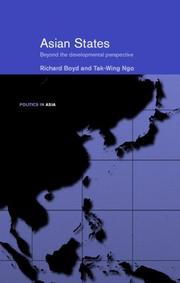
ISBN: 1280141840 0203308239 0415346126 041554663X 1134281161 9780203308233 0203567633 9780203567630 9781134281169 9781280141843 9781134281114 9781134281152 9780415346122 9780415546638 1134281153 1560067357 Year: 2005 Publisher: London New York RoutledgeCurzon
Abstract | Keywords | Export | Availability | Bookmark
 Loading...
Loading...Choose an application
- Reference Manager
- EndNote
- RefWorks (Direct export to RefWorks)
A team of international leading experts provide a much needed re-examination of the theoretical claims and the empirical foundation of developmental state theory. Asian States argues that regardless of the merits of the developmental state as an explanation of economic growth, it falls far short of being an adequate theory of the state in Asia. The contributors critically review claims about agency, state-society and state-market relations that shape developmental projects. It broadens the analysis of state involvement in developmental projects and considers the variety of political a
State, The. --- State, The --- Business & Economics --- Economic History --- East Asia --- Economic policy. --- Economic conditions. --- Etat --- Extrême-Orient --- Politique économique --- Conditions économiques --- Administration --- Commonwealth, The --- Sovereignty --- Political science
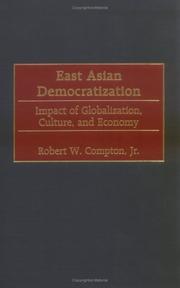
ISBN: 0275964469 0313002916 9780313002915 9798400643200 Year: 2000 Publisher: Westport, Conn. Praeger
Abstract | Keywords | Export | Availability | Bookmark
 Loading...
Loading...Choose an application
- Reference Manager
- EndNote
- RefWorks (Direct export to RefWorks)
This text creates an Asian political development model to take into account cultural and historical perspectives. This model is then tested with quantitative indicators and through a series of case studies, based on Japan, South Korea and Thailand.
Democratization --- Globalization. --- Démocratisation --- Mondialisation --- East Asia --- Extrême-Orient --- Politics and government. --- Politique et gouvernement --- Global cities --- Globalisation --- Internationalization --- International relations --- Anti-globalization movement --- Democratic consolidation --- Democratic transition --- Political science --- New democracies
Book
ISBN: 9791036561221 285399824X Year: 2020 Publisher: Aix-en-Provence : Presses universitaires de Provence,
Abstract | Keywords | Export | Availability | Bookmark
 Loading...
Loading...Choose an application
- Reference Manager
- EndNote
- RefWorks (Direct export to RefWorks)
Dans la deuxième moitié du XIXe siècle, la Cochinchine, le Tonkin et l’Annam sont devenus propriété de la France et objet d’étude pour les savants français. Venus à l’école française par choix ou sous la contrainte, les Vietnamiens découvrent une nouvelle civilisation. Dans la première moitié du XXe siècle, les lettrés et les intellectuels mènent une réflexion systématique sur l’homme en société et sur l’altérité, en puisant dans les écrits anciens et en appliquant les méthodes scientifiques occidentales. Au sein de l’École française d’Extrême-Orient, institution officielle chargée de la recherche en Indochine, les Vietnamiens accèdent au statut de membre scientifique. Nguyễn Văn Huyên, membre de l’EFEO jusqu’en 1945, représente un cas exemplaire des échanges entre l’orientalisme français et la société vietnamienne qui a ses enjeux propres liée à la domination coloniale. Dans le Vietnam indépendant, l’anthropologie sera au programme de la nouvelle université dès l’année 1945-1946. Au Vietnam, l’anthropologie est ainsi née au confluent des trois traditions intellectuelles : la France, le Vietnam et la Chine.
Ethnology --- Anthropology --- Anthropologists --- History --- École française d'Extrême-Orient. --- Scientists --- Human beings --- Cultural anthropology --- Ethnography --- Races of man --- Social anthropology --- EFEO --- Primitive societies --- orientalisme --- anthropologie --- colonialisme --- Vietnam --- Social sciences
Periodical
ISSN: 10966838 18746284 Year: 1998 Publisher: Brunswick, NJ : Transaction Publishers,
Abstract | Keywords | Export | Availability | Bookmark
 Loading...
Loading...Choose an application
- Reference Manager
- EndNote
- RefWorks (Direct export to RefWorks)
Politics --- Regional documentation --- East Asia --- Extrême-Orient --- Periodicals. --- Périodiques --- Periodicals --- Social Sciences --- Developmental Issues & Socioeconomic Studies --- Political Science --- Public Policy & Administration --- Sociology --- Extrême-Orient --- Périodiques --- EBSCOASP-E EJETUDE EJHISTO EJPOLIT EJRELAT EPUB-ALPHA-E EPUB-PER-FT --- East Asia. --- Asia, East --- Asia, Eastern --- East (Far East) --- Eastern Asia --- Far East --- Orient --- East --- Asia
Book
ISBN: 9780674725300 0674725301 0674726138 9780674726130 0674727118 9780674727113 Year: 2013 Publisher: Cambridge, MA
Abstract | Keywords | Export | Availability | Bookmark
 Loading...
Loading...Choose an application
- Reference Manager
- EndNote
- RefWorks (Direct export to RefWorks)
"Taking both a historical and a comparative view, Perkins explores the nature of economic growth in East Asia. He focuses on ten sites in East and Southeast Asia that achieved a substantial degree of economic success: China, Japan, South Korea, Taiwan, Hong Kong, Singapore, Malaysia, Thailand, Indonesia, and Vietnam. Secondarily, he discusses the failures in growth of other countries in the region, notably the Philippines. He analyzes why several of the economies of East and Southeast Asia have achieved rates of growth seldom witnessed elsewhere in the world (with a few exceptions); why some of the economies in the region have done better than the others; and why the richest economies eventually have all slowed down. He examines income distribution and the places where income inequality resulted. In looking into the sources for the high rate of growth, he analyzes how these economies and societies transformed the living standards of most their citizens"--
Economic development --- Développement économique --- East Asia --- Southeast Asia --- Extrême-Orient --- Asie du Sud-Est --- Economic conditions. --- Conditions économiques --- Développement économique --- Extrême-Orient --- Conditions économiques --- E-books --- Development, Economic --- Economic growth --- Growth, Economic --- Economic policy --- Economics --- Statics and dynamics (Social sciences) --- Development economics --- Resource curse
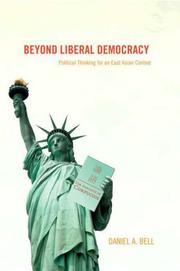
ISBN: 9780691123080 9780691123073 0691123071 069112308X 9786612129377 9786612935459 1282935453 1282129376 1400827469 9781400827466 Year: 2009 Publisher: Princeton, NJ
Abstract | Keywords | Export | Availability | Bookmark
 Loading...
Loading...Choose an application
- Reference Manager
- EndNote
- RefWorks (Direct export to RefWorks)
Is liberal democracy appropriate for East Asia? In this provocative book, Daniel Bell argues for morally legitimate alternatives to Western-style liberal democracy in the region. Beyond Liberal Democracy, which continues the author's influential earlier work, is divided into three parts that correspond to the three main hallmarks of liberal democracy--human rights, democracy, and capitalism. These features have been modified substantially during their transmission to East Asian societies that have been shaped by nonliberal practices and values. Bell points to the dangers of implementing Western-style models and proposes alternative justifications and practices that may be more appropriate for East Asian societies. If human rights, democracy, and capitalism are to take root and produce beneficial outcomes in East Asia, Bell argues, they must be adjusted to contemporary East Asian political and economic realities and to the values of nonliberal East Asian political traditions such as Confucianism and Legalism. Local knowledge is therefore essential for realistic and morally informed contributions to debates on political reform in the region, as well as for mutual learning and enrichment of political theories. Beyond Liberal Democracy is indispensable reading for students and scholars of political theory, Asian studies, and human rights, as well as anyone concerned about China's political and economic future and how Western governments and organizations should engage with China.
Democracy --- Human rights --- Capitalism --- Démocratie --- Droits de l'homme (Droit international) --- Capitalisme --- East Asia --- Extrême-Orient --- Politics and government. --- Politique et gouvernement --- Market economy --- Economics --- Profit --- Capital --- Basic rights --- Civil rights (International law) --- Rights, Human --- Rights of man --- Human security --- Transitional justice --- Truth commissions --- Self-government --- Political science --- Equality --- Representative government and representation --- Republics --- Law and legislation --- Démocratie --- Extrême-Orient
Book
ISBN: 9780521139342 9780521515467 0521139341 0521515467 9786612630699 0511749163 0511742290 051175065X 0511744455 1282630695 0511749910 051174336X 9780511750656 1139234803 1107206383 9780511743368 9780511749919 Year: 2010 Publisher: Cambridge Cambridge University Press
Abstract | Keywords | Export | Availability | Bookmark
 Loading...
Loading...Choose an application
- Reference Manager
- EndNote
- RefWorks (Direct export to RefWorks)
Why do some societies fare well, and others poorly, at reducing the risk of early death? Wealth, Health, and Democracy in East Asia and Latin America finds that the public provision of basic health care and other inexpensive social services has reduced mortality rapidly even in tough economic circumstances, and that political democracy has contributed to the provision and utilization of such social services, in a wider range of ways than is sometimes recognized. These conclusions are based on case studies of Argentina, Brazil, Chile, Costa Rica, Indonesia, South Korea, Taiwan, and Thailand, as well as on cross-national comparisons involving these cases and others.
Infants --- Nourrissons --- Mortality --- Mortalité --- East Asia --- Latin America --- Asie du Nord-Est --- Extrême-Orient --- Amérique latine --- Social policy. --- Economic policy. --- Politique sociale --- Politique économique --- Social Sciences --- Political Science --- Mortalité --- Extrême-Orient --- Amérique latine --- Politique économique --- Babies --- Infancy --- Children --- Asia, East --- Asia, Eastern --- East (Far East) --- Eastern Asia --- Far East --- Orient
| Listing 1 - 10 of 25 | << page >> |
Sort by
|

 Search
Search Feedback
Feedback About UniCat
About UniCat  Help
Help News
News